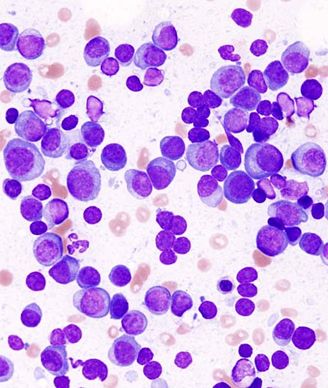FDA Grants Fast Track and RMAT Designations to CAR T Product for R/R Myeloma
The investigational CAR T-cell therapy equecabtagene autoleucel receives fast track and regenerative medicine advanced therapy designations for managing relapsed or refractory multiple myeloma.
The FDA has granted fast track and regenerative medicine advanced therapy designations to equecabtagene autoleucel (CT103A) for the treatment of patients with relapsed or refractory multiple myeloma, according to a press release from IASO Biotherapeutics.1
Equecabtagene autoleucel previously received orphan drug designation from the FDA for treating patients with relapsed or refractory multiple myeloma in February 2022.

Equecabtagene autoleucel is a B-cell maturation antigen (BCMA) CAR T-cell injection containing a CAR structure with a fully human single-chain variable fragment, CD8a hinger and transmembrane, and 4-1BB co-stimulatory and CD3ζ activation domains.
The product has robust construction and demonstrated prolonged persistency in patients based on use of strict screening and selection, as well as in-house optimization platform and manufacturing process improvement.
Investigators evaluated equecabtagene autoleucel as treatment for patients with relapsed or refractory multiple myeloma in the single-arm, open-label, multi-center phase 1/2 FUMANBA-1 trial (NCT05066646). Enrolled patients underwent infusion with equecabtagene autoleucel at a recommend phase 2 dose of 1.0 x 106 CAR T cells following lymphodepleting chemotherapy consisting of fludarabine (Fludara) and cyclophosphamide.
Primary end points of the FUMANBA-1 trial included incidence and severity of adverse effects, laboratory tests, vital signs, and physical examinations, as well as overall response rate as determined by an independent review committee. Secondary end points included overall survival, duration of response, progression-free survival, time-to-response, minimal residual disease, pharmacokinetics, and soluble BCMA levels in peripheral blood samples.
Patients 18 to 70 years old with relapsed or refractory multiple myeloma who received at least 3 prior lines of treatment including chemotherapy, proteasome inhibitors, and immunomodulatory agents were eligible to enroll on the trial. Additional inclusion criteria included having evidence of cell membrane BCMA expression, an ECOG performance status of 0 or 1, an estimated life expectancy of at least 12 weeks, and adequate organ, liver, renal, and coagulation function.
Patients with graft-versus-host disease or those who have received an autologous hematopoietic stem cell transplantation within 12 weeks before leukapheresis were not eligible for enrollment on the trial. Patients were also unsuitable for enrollment if they had insufficient mononuclear cells for CAR T-cell production, corticosteroid treatment within 7 days before screening, serious heart disease, a history of organ transplantation, central nervous system metastases, extramedullary lesions, or plasma cell leukemia.
Additionally, patients were unable to enroll on the trial if they received major surgery 2 weeks prior to leukapheresis, had any uncontrolled active infection requiring systemic therapy within 7 days prior to leukapheresis, or were pregnant.
The FDA previously granted orphan drug designation to equecabtagene autoleucel for managing relapsed or refractory multiple myeloma in February 2022.2
“[The orphan drug designation] to CT103A is of great significance to patients with multiple myeloma,” Wen Wang, MD, PhD, chief executive officer and chief medical officer of IASO Biotherapeutics, said in a press release regarding the regulatory decision. “We are looking forward to the launch of CT103A both in China and [the United States] as soon as possible to offer a life-saving treatment option to more patients.”
References
- IASO Bio announces CT103A granted regenerative medicine advanced therapy (RMAT) and fast track (FT) designations by the FDA. News release. IASO Biotherapeutics. February 11, 2023. Accessed February 15, 2023. bit.ly/3K8gjIM
- U.S. FDA grants orphan drug designation to BCMA CAR-T cell therapy co-developed by IASO Bio and Innovent. News release. IASO Biotherapeutics and Innovent Biologics. February 14, 2022. Accessed February 15, 2023. bit.ly/3lFcCAl
Navigating AE Management for Cellular Therapy Across Hematologic Cancers
A panel of clinical pharmacists discussed strategies for mitigating toxicities across different multiple myeloma, lymphoma, and leukemia populations.